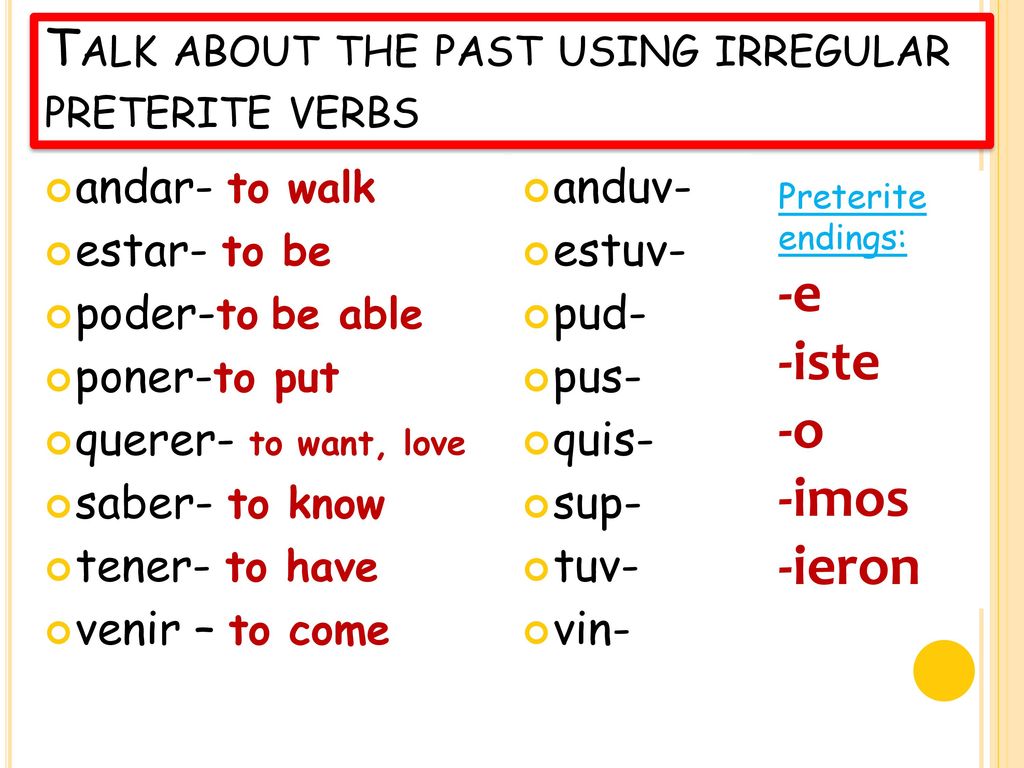Unlock the past with andar preterite! This guide equips you to accurately express past actions of “walking,” “going,” and “being about” in Spanish. We’ll explore the preterite conjugation of andar, an irregular yet essential verb for narrating past experiences. From anduviste to anduvieron, master all six conjugations and confidently express past actions in any context.
Andar in the Preterite: Your Step-by-Step Guide
Ready to walk through time in Spanish? The andar preterite, though irregular, is your key. Let’s break it down step by step.
Conjugation Conquests
First up: conjugations! Andar in the preterite doesn’t follow the usual -ar verb patterns. Memorization is key. Here’s your handy guide:
| Pronoun | Conjugation | Example |
|---|---|---|
| Yo | anduve | Yo anduve a la tienda. (I walked to the store.) |
| Tú | anduviste | Tú anduviste por el parque. (You walked through the park.) |
| Él/Ella/Usted | anduvo | Él/Ella/Usted anduvo mucho ayer. (He/She/You walked a lot yesterday.) |
| Nosotros/as | anduvimos | Nosotros/Nosotras anduvimos a la escuela. (We walked to school.) |
| Vosotros/as | anduvisteis | Vosotros/Vosotras anduvisteis por la playa. (You all walked along the beach.) |
| Ellos/as/Ustedes | anduvieron | Ellos/Ellas/Ustedes anduvieron hasta la casa. (They/You all walked to the house.) |
Try reading the examples aloud and writing them down.
Beyond “To Walk”: Andar‘s Hidden Depths
Andar in the preterite doesn’t always mean “to walk”. It can mean “to go,” “to be (around),” or “to function.”
- Anduvimos al cine. (We went to the movies.)
- Anduvo por aquí ayer. (He was around here yesterday.)
- El reloj no anduvo bien. (The watch didn’t work well.)
This expanded meaning makes andar even more useful.
Preterite vs. Imperfect: Choosing Your Tense
The preterite is for completed past actions; the imperfect is for ongoing or habitual past actions.
- Preterite: Anduve por el parque. (I walked through the park – one time.)
- Imperfect: Andaba por el parque cada día. (I used to walk through the park every day.)
The preterite captures a single event; the imperfect describes a repeated action or state of being. More details about when to use preterite vs imperfect can likely be found by exploring resources on vandertramp verbs.
Common Mistakes and How to Avoid Them
Even native speakers stumble. Watch out for these common errors:
- Confusing andar and ir: Both can mean “to go,” but their preterite conjugations differ. Ir‘s preterite forms are fui, fuiste, fue, fuimos, fuisteis, fueron.
- Conjugation Errors: Double-check the conjugation table!
Practice Makes Perfect
Use andar in various contexts—translate sentences, write stories, or have conversations. How would you say, “We walked around the city all day yesterday?” (Anduvimos por la ciudad todo el día ayer.)
Llegar in the Preterite: Pinpointing Arrival
Llegar (to arrive) in the preterite captures the specific moment of arrival.
| Pronoun | Conjugation | Example |
|---|---|---|
| yo | llegué | Llegué a casa a las seis. (I arrived home at six.) |
| tú | llegaste | ¿Llegaste temprano? (Did you arrive early?) |
| él/ella/usted | llegó | Ella llegó tarde al cine. (She arrived late to the movie.) |
| nosotros/nosotras | llegamos | Llegamos al aeropuerto a tiempo. (We arrived at the airport on time.) |
| vosotros/vosotras | llegasteis | Llegasteis justo a tiempo para la cena. (You all arrived just in time for dinner.) |
| ellos/ellas/ustedes | llegaron | Llegaron a la conclusión de que era mejor irse. (They arrived at the conclusion that it was better to leave.) |
Each example pinpoints a specific arrival moment.
Llegar in the Imperfect: The Ongoing Story
Llegar in the imperfect depicts habitual, ongoing, or background arrivals.
| Pronoun | Conjugation | Example |
|---|---|---|
| yo | llegaba | Siempre llegaba tarde a clase. (I always used to arrive late to class.) |
| tú | llegabas | ¿Llegabas a tiempo cuando vivías en Madrid? (Did you use to arrive on time when you lived in Madrid?) |
| él/ella/usted | llegaba | Él llegaba a la oficina a las nueve todos los días. (He used to arrive at the office at nine every day.) |
| nosotros/nosotras | llegábamos | Cuando éramos niños, llegábamos a casa del colegio a las tres. (When we were kids, we used to arrive home from school at three.) |
| vosotros/vosotras | llegabais | Siempre llegabais con las manos vacías. (You all always used to arrive empty-handed.) |
| ellos/ellas/ustedes | llegaban | Ellos llegaban tarde a todas las reuniones. (They used to arrive late to all the meetings.) |
The imperfect focuses on the arrival process, not a specific moment.
Choosing the Right Tense for Llegar
Consider this: “My friends arrived at eight” (Mis amigos llegaron a las ocho.) uses the preterite for a specific time. “While my friends were arriving, I prepared the cake” (Mientras mis amigos llegaban, yo preparaba el pastel.) uses the imperfect to describe an ongoing arrival during another activity.
Conjugating Traer in the Preterite
Traer (to bring) is irregular in the preterite. Memorization is your friend.
| Pronoun | Conjugation | Translation |
|---|---|---|
| yo | traje | I brought |
| tú | trajiste | You brought |
| él/ella/usted | trajo | He/She/You brought |
| nosotros/as | trajimos | We brought |
| vosotros/as | trajisteis | You (plural, Spain) brought |
| ellos/as/ustedes | trajeron | They/You brought |
Visual aids or rhymes can help memorize these irregular forms.
Nadar in the Preterite: Smooth Sailing
Nadar (to swim) is a regular -ar verb. Simply add the preterite endings to the stem (nad-).
| Pronoun | Conjugation | Example |
|---|---|---|
| yo | nadé | Yo nadé en la piscina ayer. (I swam in the pool yesterday.) |
| tú | nadaste | Tú nadaste muy rápido. (You swam very fast.) |
| él/ella/usted | nadó | Ella nadó hasta la orilla. (She swam to the shore.) |
| nosotros | nadamos | Nosotros nadamos en el mar. (We swam in the sea.) |
| vosotros | nadasteis | Vosotros nadasteis con delfines. (You swam with dolphins.) |
| ellos/ellas/ustedes | nadaron | Ellos nadaron por una hora. (They swam for an hour.) |
Comparing nadar with the irregular andar can be helpful. “I swam” (nadé) keeps the “a” from the stem, while “I walked” (anduve) loses it. This difference is important to remember. While these conjugations are widely accepted, regional variations may exist.
By practicing and understanding these nuances, you’ll master the Spanish preterite and confidently narrate your past adventures. ¡Buena suerte!
- 1 Liter to Fluid Ounces: Easy Conversion Guide - April 9, 2025
- Unlock what is the seventh month: A Cross-Cultural Calendar Guide - April 9, 2025
- Discover White Fruits: Ultimate Guide to Taste & Nutrition - April 8, 2025
















